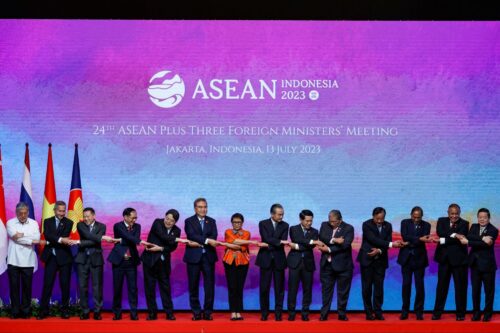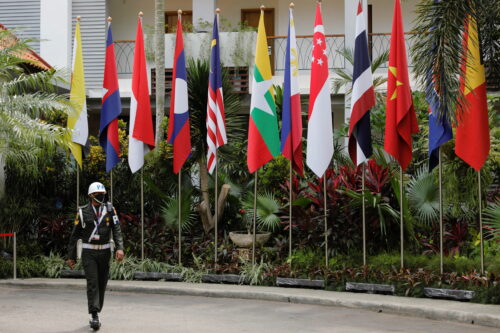China and ASEAN: A code of conduct for the South China Sea
Top China news for March 8, 2017. Get this daily digest delivered to your inbox by signing up at supchina.com/subscribe.

A code of conduct for the South China Sea and a smile at Trump
Chinese foreign minister Wang Yi gave a press conference today in Beijing, addressing a wide range of questions from journalists. There is a transcript of the session on the website of the foreign ministry, but it does not appear to be complete. Media reports filled out some of the missing remarks:
According to the China Daily, Wang said that the first draft of a Code of Conduct (COC) for the South China Sea has been completed by a joint working group comprising China and the Association of Southeast Asian Nations (ASEAN), and that “the situation in the South China Sea has calmed down visibly over the past year.” However, he issued a warning, presumably intended for American ears, stating, “If someone should try to…stir a trouble at this moment, then he will have no support other than meet the common opposition of the entire region.” The Guardian notes that Wang spoke of a serious risk of a “head-on collision” between the U.S. and North Korea, as the Hermit Kingdom ignores international opposition to its nuclear program while America has begun deploying the THAAD missile defense system and conducts “military exercises of enormous scale” with South Korea.
The South China Morning Post reports that Wang said that a meeting between the American and Chinese presidents was in the works. In other news that a cynic might say is related, the Associated Press comments that on Monday, China approved a new suite of trademarks for Donald Trump that grant him the right to use his brand in a range of industries, including hotels, insurance, and bodyguard and escort services. AP quotes Dan Plane, the director of a Hong Kong intellectual property consultancy: “For all these marks to sail through so quickly and cleanly, with no similar marks, no identical marks, no issues with specifications — boy, it’s weird.” In February, China’s trademark authorities approved an application for Trump to use his name for construction services relating to residential, business, and hotel real estate.
Women and China: A The China Project-sponsored forumSave the date: May 18 from noon to 7 p.m.
Join us at the China Institute in New York to discuss how women are shaping a rising superpower. More details are forthcoming.
Rap video about the things close to Xi Jinping’s heart
As part of the state media blitz associated with the annual Two Sessions — the meetings of the National People’s Congress (NPC) and Chinese People’s Political Consultative Conference (CPPCC) — Xinhua News Agency has released an animated music video featuring a rap song about the “six things close to Xi Jinping’s heart.” You can watch it here and read an English translation of the lyrics by The China Project. State media continues to emphasize Xi Jinping’s status as the “core” of the Communist Party’s Central Committee.
Government support for maternity and senior care
Two issues that the government planners have been wrestling with for some time are declining birth rates and the problem of how China can look after its aging population. Both have been addressed in speeches made at the Two Sessions. The China Daily reports that the Health and Family Planning Commission intends to increase the number of maternity beds by 89,000 and enhance neonatal services in hospitals over the next three years to cope with the demand unleashed by the relaxation of the one-child policy. In 2016, 17.86 million babies were born in China, up by more than 1.3 million compared with 2015. When it comes to senior citizens, the minister of civil affairs said that China will launch a campaign to improve elderly care services, and that the government would “encourage all areas of society to participate in the campaign.”
Today on The China ProjectMarch 8 is International Women’s Day, and The China Project has your guide to the challenges and celebrated accomplishments of Chinese women’s rights activists: “Hard times for feminists in China,” by our own Jiayun Feng.
This issue of the The China Project newsletter was produced by Sky Canaves, Lucas Niewenhuis, Jia Guo, and Jiayun Feng. More China stories worth your time are curated below, with the most important ones at the top of each section.
BUSINESS AND TECHNOLOGY:
- The time for paid content in China is now: Douban Time goes live / China Film Insider
Douban, a popular Chinese social networking service website that focuses on film, books, music, culture, and events, has launched its first paid content feature, called Douban Time. The platform includes curated texts, images, and sounds from writers and creators in different fields. The first offering is a 102-episode poetry program in which poets and critics will give lessons in poetry appreciation, at a cost of 128 yuan ($18). WeChat, the most popular Chinese social media network, with more than 10 million public accounts and 650 million active users, is expected to launch its own paid content feature soon. - U.S. fines ZTE of China $1.19 billion for breaching sanctions / NYT (paywall)
ZTE, China’s second-largest maker of telecom equipment, agreed to plead guilty for violating U.S. sanctions against Iran and North Korea, the U.S. Department of Commerce announced today. The company will face $1.19 billion in fines. The penalty is the largest criminal fine ever levied in a U.S. sanctions case.
- Guo Shuqing on new mission to tackle banking woes / Caixin
- China’s imports surge in February, while exports miss estimates / Bloomberg
- China shuts Hershey-Lotte plant in latest missile spat response / Bloomberg
- China tries cure by committee for corporate debt hangover / Reuters
- China’s running out of time to cut excess capacity / Bloomberg
POLITICS AND CURRENT AFFAIRS:
- China’s new civil code light on individual rights reforms / Reuters
Delegates at the National People’s Congress meeting in Beijing are expected to approve a preamble to a new civil code (民法 mínfǎ) next week. State media are hailing the law as a sign of fundamental progress in the protection of citizens’ rights and codifying their responsibilities: China.com.cn says the code is a “mother law” that will solve many problems that are “peculiar to China,” while Guangming says that “in the eyes of the civil code, every citizen is the whole country” (both links are to Chinese-language articles). But Reuters reports that many legal experts say the wording released so far “falls short of enshrining sweeping private rights and makes little progress in key areas including property and civil liberties.” Reuters has also published a summary of some of the specific provisions of the new law. - Can China’s powerful new navy behemoth outclass America’s warships? / SCMP The People’s Liberation Army Navy has a new warship called the Type 055 destroyer, which could enjoy its maiden voyage as early as next year. The South China Morning Post article linked above includes a series of infographics about the vessel, and says that “the 055 will probably be the world’s second-biggest and most powerful warship in commission, after the USS Zumwait.”
- China tries to defuse tensions over North Korea / NYT (paywall)
- Observations on China’s new international cyberspace cooperation strategy / Lawfare
- Will Xi Jinping visit U.S. this year? There’ll be good news, replies China’s foreign minister / SCMP
- EU police nab slippery eel smugglers doing trade with China / McClatchy
SOCIETY AND CULTURE:
- Zhaopin survey says women in China still facing discrimination in the work place / TechNode
Zhaopin, the largest online employment platform in China, recently surveyed 128,500 people in its annual report on Chinese women in the workplace. Key findings in the report include: About 22 percent of women experienced severe or very severe discrimination when seeking employment, compared with 14 percent of men; better-educated women are more likely to be discriminated against when applying for jobs; it takes longer for women to be promoted; and leadership positions are still dominated by men.
Quartz noted that International Women’s Day in China is “being turned into a celebration of women’s purchasing power,” with many retailers rebranding it as a “Queen Day” for women to celebrate material indulgence and cosmetic beauty. Moreover, Quartz comments that despite their growing economic power, Chinese women feel that they are “going backward under President Xi Jinping,” a theme we examine in detail in an article published today on The China Project about the challenges facing Chinese feminists. - Education is top of the giving class / Financial Times (paywall)
Philanthropy in China is booming: Donations to charitable causes by the country’s wealthiest people grew by 50 percent in 2016 compared with the previous year. But the numbers are still relatively low: Total donations by the country’s top 100 philanthropists in 2016 were $4.6 billion, whereas the Bill & Melinda Gates Foundation in the U.S. gave out $4.2 billion in 2015. More than half of philanthropic donations by China’s wealthiest people are directed toward educational causes.
- Opinion: I went to jail for handing out feminist stickers in China – the “Feminist Five” were arrested two years ago around this time. For more on feminism in China, read a The China Project feature here / The Guardian
- China’s former child brides refuse to be silenced / SCMP
- History of Chinese sex slaves buried as brothels demolished / SCMP
- Plight of Chinese turtles shows lax protection in nation’s nature reserves / Science
- ‘Logan’ tops China’s box office despite cuts by censors / LA Times
- China’s new film ratings don’t cut out the censors / WSJ (paywall)





